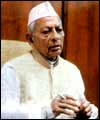













|
BANKING
How The Cookie
Crumbles
LÉ AffairÉ MMCB is the tip of an
iceberg. The co-operative bank sector in Gujarat is headed for one big
fall.
By Suveen
K. Sinha
 |
|
Fun for some; serious
business for others: A protest against MMCB in Ahmedabad |
When
Bhalerao Bhamare retired as a superintendent with the Gujarat Transport
Department three years ago, he put his lifetime earnings-Rs 4.5 lakh-in
fixed deposits with Madhavpura Mercantile Cooperative Bank, the second
largest cooperative bank in Gujarat and a scheduled one at that -a status
accorded by the Reserve Bank of India that gives a high degree of credence
to its cheques, demand drafts, and pay orders. Today, all he has, is a pay
order issued by MMCB, which the drawee bank, Dena Bank, refuses to cash.
The teachers and other employees of Anand
Niketan, a school in Ahmedabad, may have to go without pay next month. The
school had parked all its funds with MMCB and has no money to pay
salaries. Jitendra Shah, an Ahmedabad-based edible oils trader, was in
Gandhinagar on April 9, when a friend called to say that there were
rumours that MMCB was in trouble. Shah, whose association with the bank
goes back to 1985, thought it was just that, a rumour. But when he came
back to Ahmedabad, he, like everyone else, panicked. Shah was standing in
the queue when the bank opened next on March 12 and managed to withdraw Rs
5 lakh of his total deposits worth Rs 11 lakh. March 12 was the last day
MMCB was open for business.
Bhamare, Shah, and Anand Niketan are just
three of MMCB's depositors who have no idea what will become of their
monies parked with MMCB, and with the other 339 cooperative banks in
Gujarat. Shah has since formed the Nav Gujarat Banks Customer Protection
Council, whose membership has swelled to 500. Along with a clutch of
depositors, he has been knocking every door in Ahmedabad and Gandhinagar:
Chief Minister Keshubhai Patel; V.S. Das, who heads Reserve Bank of
India's regional office; cooperatives Minister Ramanlal Vora; State
Finance Minister Vajubhai Vala; Ahmedabad Police Chief P.C. Pande; the
state registrar for cooperatives; and just about anyone else who may be
able to help.
Like Shah, this correspondent had no luck
when it came to meeting with Vora despite sustained efforts over four
days; his mobile phone remains switched off round the clock. According to
Bhupendra Mehta, a trader in iron and steel, Vora denied any knowledge of
MMCB being in trouble when a group of depositors met him at 4:30 on the
evening of March 14. And Das, who had been addressing press conferences
till a week ago, refused to comment on the story.
Passing the buck
|

|
 |
 |
 |
|
"There should
be minimum interference from the registrar of co-operatives"
N.PATEL,
Vice Chairman, GUCBF |
"There is
a
lack of professionalism in co-operative banks"
N.P.MANKAD,
GM, Co-op Bank of Ahmedabad |
"We don't have
an authentic estimate of Madhavpura's liabilities"
AMBUBHAI PATEL,
MD, Kalupur Co-op Bank |
"All
problems
will be solved
if we revive MMCB"
ATMARAM
PATEL,
Chairman,
GUCBF |
Atmaram Patel, a Congress MP from Mehsana
and Chairman of Gujarat Urban Cooperative Banks Federation (GUCBF), uses
and re-uses the word Katibaddh (Gujarati for committed) when he talks of
efforts to revive Madhavpura. ''All problems will be solved if we can
manage to revive Madhavpura and keep it running.'' The problem is, no one
knows how it can be done or whether it is doable at all. Rumours abound.
Every two hours, 'information' comes from Gandhinagar, the state capital
30 km away, of a press conference being called to announce a vital
breakthrough, or of some fresh date for a crucial meeting in New Delhi.
''We don't even have an authentic estimate of Madhavpura's liabilities,''
moans Ambubhai M. Patel, Managing Director of Kalupur Commercial
Cooperative Bank, the largest cooperative bank in Gujarat.
Of course, committees have been set up. The
central registrar of cooperatives has constituted no less than three: one
to revive MMCB, another to advise its administrator (S. Ramachandran, a
former Bank of Baroda GM pulled out of retirement), and a third to go into
its irregularities and mismanagement. All hopes are now pinned on the
Union Government as the State Government has refused point blank to extend
any finances on the pretext that MMCB has branches in many states,
bringing it under the purview of the Multi-State Cooperatives Act.
The onus is, therefore, on the Centre. The
Gujarat Urban Cooperative Banks Federation wants the Centre to provide Rs
500 crore and the RBI to release money from its arm, the Deposit Insurance
and Credit Guarantee Corp. The fledgling depositors' association wants the
liabilities to be met thus: 25 per cent each by the Central and State
governments, another 25 per cent through possible recovery of dues, 15 per
cent by withholding the payment of deposits of other cooperative banks by
50 per cent, and 10 per cent through the insurance scheme.
Yet another formula doing the rounds has
been proposed by Bhuj Mercantile Cooperative Bank Chairman M.H. Morabia.
Bhuj Mercantile happens to be one among the 168 smaller cooperative banks
that have substantial funds with MMCB. The deposits were made as RBI
allows these banks to meet their SLR requirements by investing 10 per cent
(of their deposits) with scheduled cooperative banks and the remaining 15
per cent in government securities. Morabia wants cooperative banks with
deposits in MMCB to forego interest for three years and contribute
additional funds worth 50 per cent of their respective deposits to revive
it. Even the Wholesale Fruit Merchants Association, which has 140 members,
has come out with a proposal.
All steak; no potatoes
The proposals have all been met with the
same scepticism. ''What on earth can be the possible rationale for the
Centre providing Rs 500 crore to save a cooperative bank,'' asks a local
analyst. The RBI has said nothing about releasing money from the deposit
insurance scheme. Chief Minister Keshubhai Patel has written to the Centre
to guarantee the amounts private parties may raise to save Madhavpura, but
State Finance Minister Vala candidly says he doesn't expect North Block to
oblige.
The guarantees are crucial. Kalupur, for
instance, had provided MMCB Rs 25 crore in call money market just before
trouble broke out and Rs 5 crore after it. It is ready to provide Rs 15
crore more, but only if it is guaranteed by either the State government or
the Gujarat State Cooperative Bank, the apex bank of the sector. While the
168 smaller cooperative banks that have funds parked in MMCB want to
revive it, the 150 bigger cooperative banks, who are actually MMCB's
rivals, are hoping it will be liquidated. Doubts are also expressed over
GUCBF's sincerity as its Chairman Atmaram Patel happens to be a Congress
veteran, while the state government is run by the Bharatiya Janata Party.
Curiously, Atmaram Patel's deputy, Natwarlal Patel, known all over
Ahmedabad as Nattu Mama (Uncle), used to be a business partner of MMCB
Chairman Rameschandra Nandlal Parekh. Together they built the Madhavpura
marketing complex in 1984. But Parekh usurped the front portion of the
complex and made it MMCB's head office. An incensed Nattu Mama walked out
and set up his own bank, Bhagyodaya Cooperative Bank. They have been sworn
enemies ever since.
A breach of trust
The MMCB imbroglio seems to have eroded
public confidence in the cooperative banking system. Which is why merely
reviving MMCB will not be enough. Satish Mehta, who runs a small printing
press in Ahmedabad, and was lucky enough to extricate his Rs 60,000 the
day the run on MMCB began (March 8), has deposited it in the local
post-office. He has sworn not to put his money in a bank. Jitendra Shah is
more liberal. He is prepared to deal with nationalised banks.
There is also a growing suspicion that the
government could not have been entirely unaware of the goings on. ''There
is clearly a collusion between the managements of cooperative banks, the
urban cooperative bank division of the RBI in Mumbai, its regional office
in Ahmedabad, and the registrar in the state cooperative department,''
says Rama Reddy, President of the Hyderabad-based Cooperative Development
Foundation. He points out how MMCB flouted CRR and SLR norms, limits on
lending to individuals and business groups, and the limit on lending
against shares.
Today, nationalised and private banks do
not accept cheques issued by cooperative banks and are steadfastly
refusing to provide them letters of credit. Cooperative Bank of Ahmedabad,
which has a deposit of Rs 1 crore with ICICI Bank, has been trying in vain
to get an loc of Rs 30 lakh that it is entitled to. ''They (ICICI Bank
brass) have told me that I am free to withdraw the deposit but no loc
would be given,'' says the bank's General Manager, Naishadh P. Mankad. And
Mankad's is one of the healthier banks with its deposits of Rs 300 crore
exceeding its advances by a comfortable Rs 100 crore.
RBI's handling of Lé Affairé Madhavpura
hasn't helped. ''Bank of India (which has taken a hit of Rs 150 crore)
immediately started proceedings (against Madhavpura). Why couldn't the RBI
do the same?'' asks Bhupendra Mehta. Mankad has another complaint: ''I
believe MMCB's current account with RBI was overdrawn only to the extent
of Rs 23 crore on March 13. Instead of squaring it, the Central Bank
suspended clearing of all cooperative banks in Ahmedabad. RBI could have
started dialogues on March 10, itself, which was a holiday, instead of
waiting till March 13.''
The Madhava Rao Committee, set up by the
RBI, had suggested as far back as 1999, that the current framework of
cooperative banks being under two masters-the RBI and the registrar of
cooperatives-should be done away with. Further, cooperative banks with
branches in more states than one fall under the central registrar and
those confined to one state fall under the state registrar. All this gives
enough room for the buck to be constantly passed around from one office to
another. Incidentally, no action has been taken so far to implement the
committee's recommendations. Two other committees-the Khokhani Committee
and one under Atmaram Patel-were set up by the Gujarat government to
reform the state's cooperative laws, but no one quite recollects what
happened to their reports.
Crude cooperations
When talking to BT, Patel took a while to
recall that he had indeed headed such a committee but offered that his
government headed by Shankarsinh Vaghela fell before the committee's
recommendations could be studied. Abolishing the current structure to
simply bring the cooperative banks under the Companies Act could be a
solution. But the immediate need is to ensure proper implementation of the
existing norms, all of which were flouted by MMCB.
Mankad also points to the lack of
professionalism among cooperative banks. Most of these banks started when
a bunch of small time traders, unable to get finance from the banks that
had been nationalised in 1969, set up their own banks. They were helped in
no small measure by the traditionally strong cooperative movement in
Gujarat. MMCB, for instance, was born in Ahmedabad's Madhavpura spices
market.
Over time, in their zeal to raise deposits,
these banks forgot the basic tenet of dealing only with full-fledged
members that had voting rights and acquired a legion of nominal and
associate members that easily outnumbered the voting members. The legacy
of this origin is strong, almost incestuous, links across cooperative
banks as directors of one freely avail of funds from another. The fact
that most bank founders have also been active in politics has added
another angle to it.
The state government often turns to
cooperative banks for cash. In 1998, the cooperative banks of Gujarat
invested as much as Rs 270 crore in Narmada Bonds. The cooperative banking
sector is, thus, no longer viewed as representative of the cooperative
ideology and is seen to have become the fiefdom of a few. Sums up Reddy:
''They are non-cooperatives under the camouflage of cooperatives.'' Not
that these ills are new. At least 12 cooperative banks-among them Relief
Merchantile Cooperative Bank, Bhagyalakshmi Cooperative Bank, Sahyog
Cooperative Bank, and Harsiddh Cooperative Bank-are said to be in various
stages of liquidation, though the process has been stalled in some cases
due to political pressure or litigation. In a recent letter to the Union
Finance Minister, Bharat Gariwala, Convenor of BJP's economic cell in the
state, wrote: ''The recent fraud committed by MMCB is just a tip of the
iceberg... The cooperative banks in Gujarat have surplus funds of Rs
10,000 crore and, hence, many unscrupulous elements as directors of these
banks have started manipulating such money fraudulently...''
For the moment, everyone is waiting with
bated breath to see what happens when the RBI's current 45-day moratorium
on breaking deposits before they mature ends by month-end. ''There is no
clarity even about the date on which this moratorium would end-April 26,
April 28, or May 1,'' says Ambubhai Patel of Kalupur, as he recalls how
his bank worked round the clock on March 12 and 13, to pay a total of Rs
250 crore to depositors. To avoid a recurrence, he has continued to pay
those breaking deposits even during the moratorium. Kalupur's deposits,
share capital, and free reserves provide a Rs 1,000 crore surplus over its
advances of Rs 650 crore.
Not every bank has this buffer. And a
second run on the cooperative banks appears imminent whenever the RBI's
moratorium comes to an end. ''We will all be lining up,'' hollers a group
of depositors camping outside MMCB headquarters. Katibaddh is the word
that comes to mind.
|

